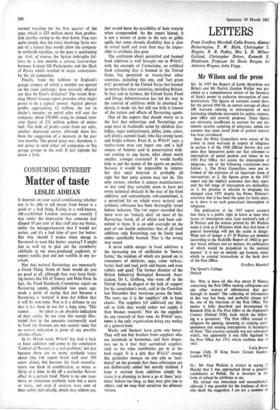Mr Wilson and the press
LETTERS
From Geoffrey Marshall, Cohn Brown, Alastair Hetherington, T. W. Blyth, Christopher T. Higgins, R. R. Pedley, Mrs L. H. Milner- Gulland, Christopher Driver, Kenneth R. Middleton, Professor Sir Denis Brogan, Sir Anthony Wagner, John Tripp.
Sir: In 1957 the Report of Lords Monckton and Birkett and Mr Patrick Gordon Walker was pre- sented as a comprehensive review of the Secretary of State's power to authorise interception of com- munications. The figures of warrants issued show, for the period 1945-56, an annual average of about 190 warrants relating to interception of mail (excluding telephone intercepts) for police, customs, post office and security purposes. These figures are obviously insufficient to account for any sys- tematic security sampling of telegrams, unless one assumes that some novel form of general warrant has been introduced.
Since the Privy Councillors were aware of the power to issue warrants in respect of telegrams in section 4 of the 1920 Official Secrets Act and since they themselves point out that reference to interception of postal packets and letters in the 1953 Post Office Act covers the interception of telegrams, one of the following conclusions must follow: 1, The Privy Councillors were not in- formed of the existence of an important form of interception; or 2, the figures given in the 1957 report and the implicit assurance that they repre- sent the full range of interception are misleading;
or 3, the practice in relation to telegrams has changed since 1957 despite the Prime Minister's assurance that it has been the same for forty years; or 4, there is no such generalised interception of telegrams.
The publication of the 1957 report assumed that there is a public right to know at least what forms of interception exist. Last weekend's talk of D Notices and the notices printed by Mr Watkins make it look as if Ministers think that that form of general knowledge will put the realm in danger. What sort of danger is it? D Notices are intended (according to the Radcliffe Report of 1962) to pro- tect 'naval, military and air matters, the publication of which would be prejudicial to the national interest' It is not an entirely apt formula under which to conceal transactions at the back door of the Post Office.
Oxford






























 Previous page
Previous page